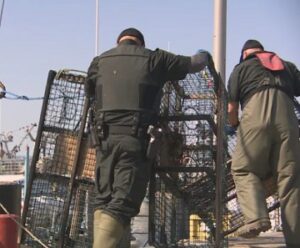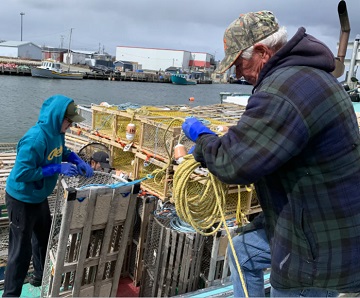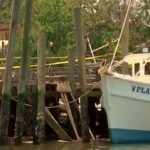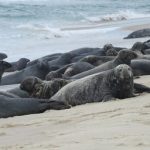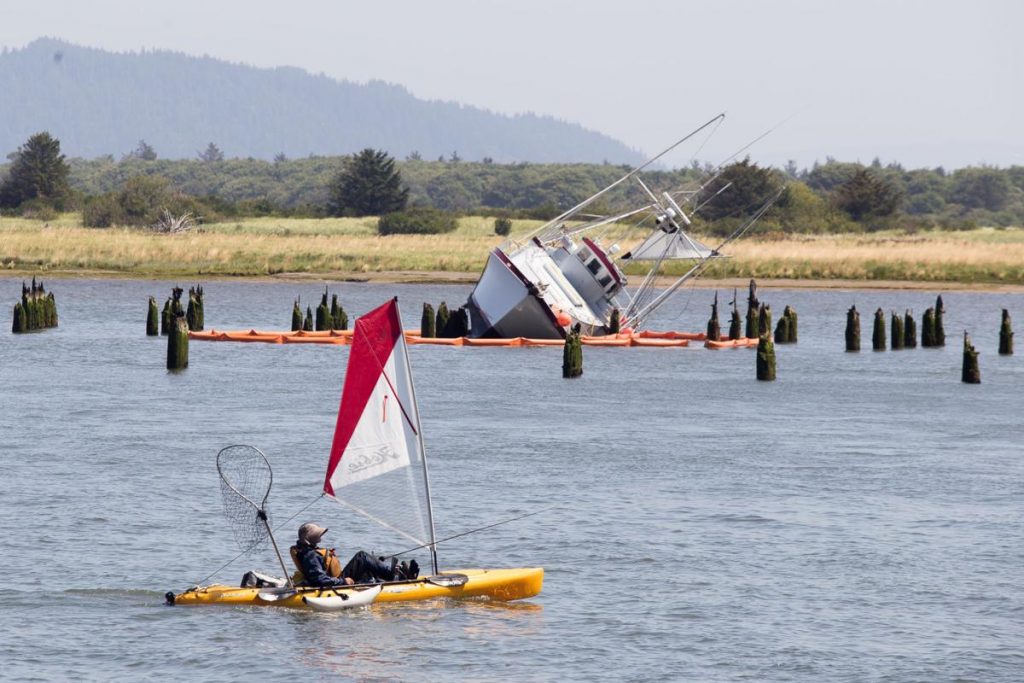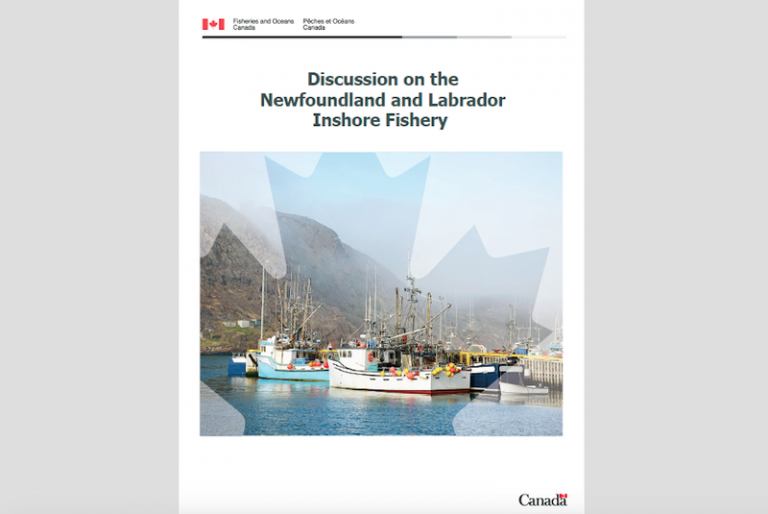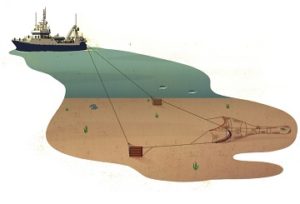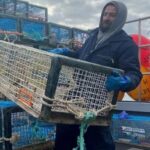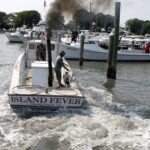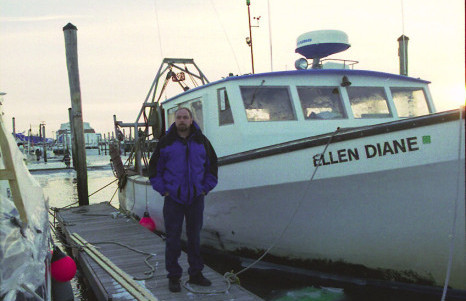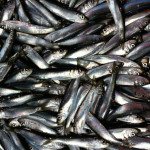Tag Archives: Nova Scotia
N.S. lobster facility temporarily halts processing, blames lower catches
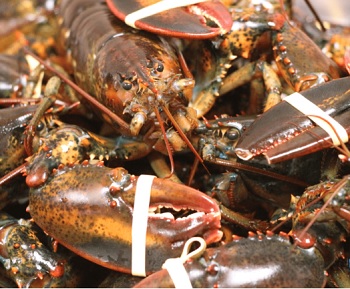 The Montreal-based owners of Riverside Lobster International at Meteghan, N.S., say the plant will not process lobster this fall and winter, citing lower catches in Maine and the Maritime provinces. “It’s an unfortunate situation, but right now that’s about all that we know. We’re not running this fall and there’s been no decision yet in terms of what’s going to happen for the spring,” “We’re seeing lower landings and not necessarily just in this area. We’re seeing it from Maine to New Brunswick to Nova Scotia. It’s affecting processing facilities and not just not just Riverside.” >>click to read<< 11:25
The Montreal-based owners of Riverside Lobster International at Meteghan, N.S., say the plant will not process lobster this fall and winter, citing lower catches in Maine and the Maritime provinces. “It’s an unfortunate situation, but right now that’s about all that we know. We’re not running this fall and there’s been no decision yet in terms of what’s going to happen for the spring,” “We’re seeing lower landings and not necessarily just in this area. We’re seeing it from Maine to New Brunswick to Nova Scotia. It’s affecting processing facilities and not just not just Riverside.” >>click to read<< 11:25
Canada, Nova Scotia move to improve fishing vessel safety
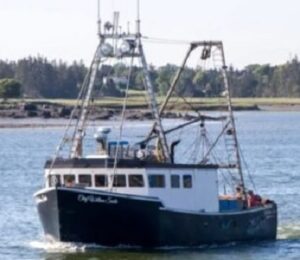 On the eve of the most lucrative fishery in Canada, federal and provincial authorities are ramping up fishing vessel inspections in Nova Scotia seeking proof of safety procedures and annual inspections of hoists and other lifting devices. Lobster season in southwest Nova Scotia opens in two weeks. Some of the increased scrutiny is being attributed to the sinking of the Chief William Saulis, a scallop dragger that went down in heavy seas near Digby in December 2020. All six men on board died. Transport Canada has served notice that its marine inspectors want to see written safety procedures on board and proof crew members are familiar with them. “Failure will result in a deficiency notice or detention of the vessel,” says spokesperson Sau Sau Liu. Video,>>click to read<< 07:08
On the eve of the most lucrative fishery in Canada, federal and provincial authorities are ramping up fishing vessel inspections in Nova Scotia seeking proof of safety procedures and annual inspections of hoists and other lifting devices. Lobster season in southwest Nova Scotia opens in two weeks. Some of the increased scrutiny is being attributed to the sinking of the Chief William Saulis, a scallop dragger that went down in heavy seas near Digby in December 2020. All six men on board died. Transport Canada has served notice that its marine inspectors want to see written safety procedures on board and proof crew members are familiar with them. “Failure will result in a deficiency notice or detention of the vessel,” says spokesperson Sau Sau Liu. Video,>>click to read<< 07:08
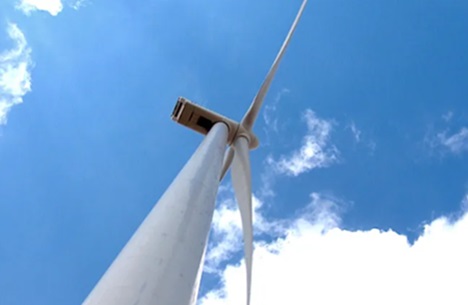
Fishermen in Maine lobbied to keep wind farms out of crucial fishing grounds. Will it happen in N.S.?
A no-compromise lobbying campaign by Maine lobster harvesters has helped keep wind farms out of a crucial lobster fishing area in the Gulf of Maine. And that has some fishermen in Nova Scotia casting an envious eye south of the border. “I’m pleased to see that happen in Maine. We’d like to see the same sort of diligence taken in Nova Scotia,” said Tommy Amirault, a fisherman from Pubnico and president of the Coldwater Lobster Association. “Maine obviously has concerns. It would be nice to 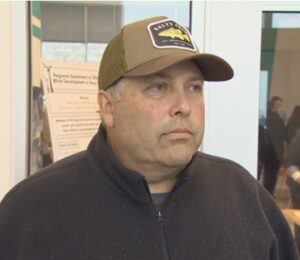 see both provincial and federal governments take our concerns into practice,” Amirault said. “We didn’t mince words that we opposed offshore wind anywhere in the Gulf of Maine. It’s one of the most productive ecosystems in the world. And we really didn’t think that this is the place to solve the renewable energy crisis,” said McCarron. In Nova Scotia, the process has just begun. He said it’s no surprise fishermen have concerns about where it happens. >>click to read<< 06:57
see both provincial and federal governments take our concerns into practice,” Amirault said. “We didn’t mince words that we opposed offshore wind anywhere in the Gulf of Maine. It’s one of the most productive ecosystems in the world. And we really didn’t think that this is the place to solve the renewable energy crisis,” said McCarron. In Nova Scotia, the process has just begun. He said it’s no surprise fishermen have concerns about where it happens. >>click to read<< 06:57
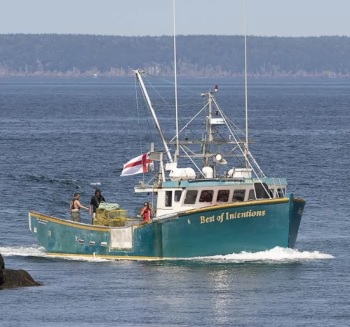
More than 50 Indigenous fish harvesters in the Maritimes charged or on trial
Three years after a First Nation started a self-regulated lobster fishery that sparked protests and violence in Nova Scotia, federal prosecutors are pressing ahead with charges against dozens of Indigenous fishers, some of whom are planning constitutional challenges. On Sept. 17, 2020, the Sipekne’katik First Nation issued five lobster licences to its members, saying they could trap and sell their catch outside the federally regulated season. The bold move came exactly 21 years after the Supreme Court of Canada affirmed the treaty right of Indigenous groups in Eastern Canada to hunt and fish for a moderate livelihood, but interpretations of that landmark ruling remain in dispute. >>click to read<< 09:25
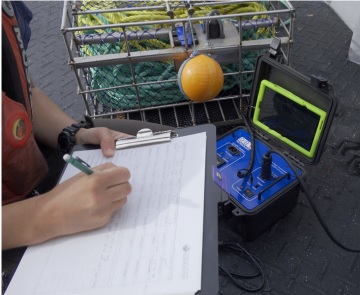
Gear-lending program has harvesters working through closures and trying ropeless fishing gear without commitment
Snow crab fishers in one area of Nova Scotia had a new visitor this season and found themselves closed out of their fishing waters. “We got a 37 percent cut in our quota and [Northern right] whales presented themselves in our zone for the first time ever so [it was] quite stressful,” said Marc Lefort, a snow crab harvester in western Cape Breton Island and a member of Area 19 Snow Crab Fishermen’s Association in Cheticamp, N.S. He’s been fishing for 19 years in the area. “It was a challenging season.” The Northern right whale is critically endangered and conservation efforts have targeted fisheries using fixed gear, or traps connected to buoys by rope. Because whales can be entangled in the fishing gear, fisheries for lobster and snow crab have been forced to think of new measures – and new fishing gear – to protect the marine mammals. >>click to read<< 12:24
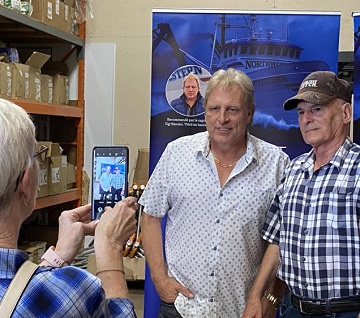
Deadliest Catch star visits Pictou to promote technology combatting ghost fishing gear
Any fisherman understands that keeping the waters clean will help ensure a viable future for the industry. “If you want a future, you have to invest in that future,” said Capt. Sig Hansen from Discovery Channel’s The Deadliest Catch. “So why not try to keep our oceans clean? That’s our responsibility.” Hansen has partnered with Resqunit (pronounced “rescue unit”), lending his star power to an endeavor they hope will assist in helping to protect the environment in which fishermen and women ply their trade. The Resqunit is a lost gear retrieval unit that can be attached to a line of traps, in case a fisher loses a buoy because of storms, accidents or by other means. It includes a user-controlled timer release that is set by using on an app on your phone. If needed, the unit will deploy after a set length of time, rise to the surface and allow fishers to retrieve their traps. >>click to read<< 14:04

Observer companies dumped from monitoring of N.S. lobster fishery
This season, DFO will rely solely on an inshore industry association to assess what other species are being accidentally captured — what’s known as bycatch — in the lobster fishery from Halifax through the Bay of Fundy. Observer companies Javitech Atlantic in Dartmouth and Halifax’s Atlantic Catch Data have been part of the bycatch monitoring program since it was launched in 2018 to assess and demonstrate sustainability in the fishery worth half a billion dollars. Both companies are out for now. In recent years, they have not delivered anywhere near the sampling provided by the Yarmouth-based Southwest Lobster Science Society, which was created by five fishing associations to provide bycatch monitoring. >>click to read<< 08:30
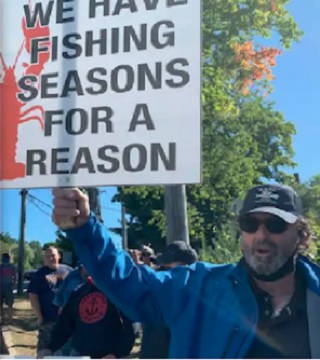
RUBENSTEIN: The endless Maritime lobster war
Nova Scotia has a series of historic treaties with the Mi’kmaq dating back to the 1720s, 150 years before any of the numbered treaties in the rest of Canada. These agreements are known as the Peace and Friendship Treaties and were designed to reduce warfare and to regulate trade between the indigenous and settler populations. While these treaties contained few monetary and no land transfer provisions, they guaranteed hunting, fishing and land-use rights for the descendants of the indigenous signatories. These Peace and Friendship Treaties remain in effect today but were regularly but improperly denied or ignored by the Crown during much of Nova Scotia’s past. Today, those ignoring the treaties and court rulings stemming from them are the Mi’kmaq themselves. >>click to read<< 10:27
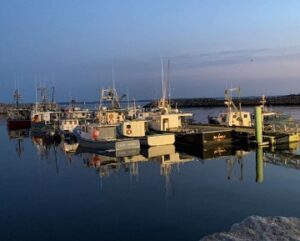
DFO calls for calm in St. Mary’s Bay as enforcement continues
The Department of Fisheries and Oceans calling for safety and patience in St. Mary’s Bay. Tensions have been rising once again due to out of season lobster fishing taking place. In a statement, DFO says they’re committed to a renewed relationship with Indigenous peoples, so they can exercise their Treaty rights to fish. They say many are exercising that right through the Food, Social and Ceremonial fishery, authorized by DFO. But they say it has to comply with the Fisheries Act, and they are seizing gear and laying charges for those who don’t follow the rules. DFO has been getting flack from local commercial fishers and opposition leaders, demanding that they do more to enforce the rules. >>click to read<< 08:43

RCMP respond to Saturday boat fire at in Digby County, N.S.
The Digby RCMP officers and fire fighters responded to a report of a fishing boat that caught fire at the Sandy Cove wharf in Digby, N.S., Saturday. In a news release Sunday, police say the fire did spread from a 36-foot fishing boat to a second boat also docked at the wharf. Once the fire was extinguished, police conducted an investigation into the cause. After reviewing evidence, which included statements and video surveillance, RCMP determined a failure of electrical components on board the boat was to blame. Police say the fire was not deemed suspicious, and the investigation has been concluded. >link< 12:14
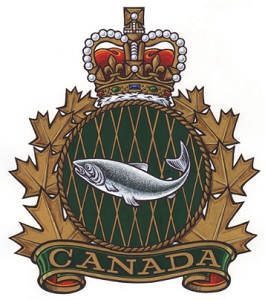
Statement from Fisheries and Oceans Canada regarding lobster fishing in St. Marys Bay, Nova Scotia
Fisheries and Oceans Canada (DFO) is committed to a renewed relationship with Indigenous peoples based on recognizing rights, respect, collaboration, and partnership. As part of that commitment, we are working with First Nations harvesters so that they can exercise their Supreme Court-affirmed Treaty right to fish through various DFO-authorized fisheries. These fisheries include food, social and ceremonial (FSC), and communal commercial fisheries, including interim understandings reached to fish in pursuit of a moderate livelihood. >>click to read<< 10:14
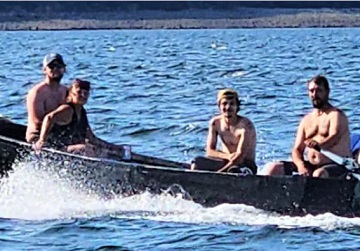
Nova Scotia fishers, Indigenous stakeholders call for more dialogue amid violence
As Nova Scotia RCMP continues to investigate violence on a wharf in St. Mary’s Bay, stakeholders on both sides are calling for more conversation instead of violence. The Maritime Fishermen Union called on all levels of government, including fishers on both sides to get to the table. “Our largest concern is the conservation of the stock on St. Mary’s Bay,” Ruth Inniss, a fisheries adviser with the Maritime Fishermen Union, said. “We tried to bring all the players of the problem to the table to solve the problem. The problem clearly hasn’t been solved.” Video, >>click to read<< 09:04
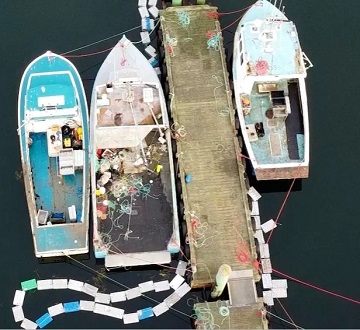
‘Enforce the laws’: N.S. Liberals to feds, province on lobster dispute
As the conflict over Sipekne’katik’s moderate livelihood fishery once again heats up in St. Marys Bay, the provincial Liberal party has split from their federal counterparts. On Tuesday, Nova Scotia Liberal Leader Zach Churchill called for the provincial government to start revoking the licences of any buyers found to be purchasing lobster caught without a licence issued by Fisheries and Oceans Canada (DFO). And he called out the federal government for a lack of enforcement of the Fisheries Act. “We are talking about hundreds of thousands or millions of dollars of lobster being landed illegally. There has to be a disincentive. … DFO also has to enforce the laws of the land which prohibit large-scale poaching.” >>click to read<< 12:34
RCMP investigate assault, theft from First Nation lobster harvester near Digby
 RCMP in Digby, N.S., are looking for suspects in an alleged theft and assault of a lobster harvester from the Sipekne’katik First Nation earlier this month in St. Mary’s Bay. The Mounties say four people stole a crate full of lobster worth $400 from a boat at the Weymouth North wharf near Digby on Aug. 2. When confronted by the owner, a Sipekne’katik woman, they dumped the lobster into the water and allegedly threw the empty crate at the owner hitting her on the arm. The victim was uninjured. The details released by the RCMP match those in an incident described by Sipekne’katik harvester Sheyanne Francis and captured in a video by Indigenous broadcaster APTN. >>click to read<< 22:03
RCMP in Digby, N.S., are looking for suspects in an alleged theft and assault of a lobster harvester from the Sipekne’katik First Nation earlier this month in St. Mary’s Bay. The Mounties say four people stole a crate full of lobster worth $400 from a boat at the Weymouth North wharf near Digby on Aug. 2. When confronted by the owner, a Sipekne’katik woman, they dumped the lobster into the water and allegedly threw the empty crate at the owner hitting her on the arm. The victim was uninjured. The details released by the RCMP match those in an incident described by Sipekne’katik harvester Sheyanne Francis and captured in a video by Indigenous broadcaster APTN. >>click to read<< 22:03
N.S. fishing industry, conservation groups at odds over new herring quota
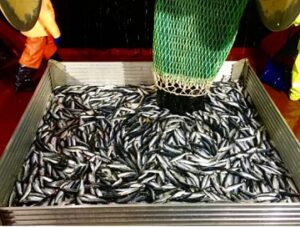 Nova Scotia’s fishing industry and conservation groups are at odds over a new herring quota set by Fisheries and Oceans Canada (DFO) this season. The quota, or total allowable catch (TAC), off southwestern Nova Scotia and New Brunswick is now limited to 21,000 tonnes for 2023, an 11 per cent reduction from the previous year. The commercial herring fishery is worth about $19.5 million, according to DFO. But the new quota doesn’t sit well with Oceans North and the Ecology Action Centre. Ian McIsaac, president of the Seafood Producers Association of Nova Scotia, said the industry is disappointed that the quota was cut. >click to read< 16:31
Nova Scotia’s fishing industry and conservation groups are at odds over a new herring quota set by Fisheries and Oceans Canada (DFO) this season. The quota, or total allowable catch (TAC), off southwestern Nova Scotia and New Brunswick is now limited to 21,000 tonnes for 2023, an 11 per cent reduction from the previous year. The commercial herring fishery is worth about $19.5 million, according to DFO. But the new quota doesn’t sit well with Oceans North and the Ecology Action Centre. Ian McIsaac, president of the Seafood Producers Association of Nova Scotia, said the industry is disappointed that the quota was cut. >click to read< 16:31
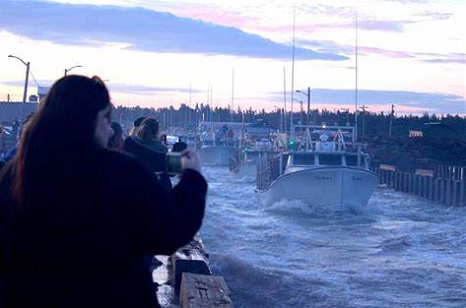
Fall fishery finally gets underway
On calm waters on a beautiful August morning, the fall lobster season in LFA 25 finally opened on Sunday following several delays due to weather conditions. The fall fishery was scheduled to open on Aug 9, but last Monday the Department of Fisheries and Ocean (DFO) decided to delay the opening until at least Aug 10 because of unfavourable forecasts. On Aug 11, it was confirmed that the LFA 25 fall lobster season would open at 6 am on Sunday, but only to set the gear. An agreement was made there would be no lobster fishing on Sunday. Photos, >click to read< 08:44
New commercial whelk fishery to open in eastern Nova Scotia
 A new commercial Whelk fishery that will officially start in the spring of 2024 was announced Friday outside Louisbourg Seafood facilities in Louisbourg, N.S. “It’s a big deal and it means we will have stability going forward,” said Al MacLean, senior operations manager for Louisbourg Seafoods. Whelk is a large sea snail that is harvested in deep waters and generally exported to Asia. The goal is to increase the availability and quality of seafood in international markets, while creating jobs here at home. “We have 65 people working here today and they’ll work for three-and-a-half to four months beyond what their normal work period was and we hope in the future that we see that grow. We can see allocations to Louisbourg grow and our production staff grow along with it,” said MacLean. Video, >click to read< 08:02
A new commercial Whelk fishery that will officially start in the spring of 2024 was announced Friday outside Louisbourg Seafood facilities in Louisbourg, N.S. “It’s a big deal and it means we will have stability going forward,” said Al MacLean, senior operations manager for Louisbourg Seafoods. Whelk is a large sea snail that is harvested in deep waters and generally exported to Asia. The goal is to increase the availability and quality of seafood in international markets, while creating jobs here at home. “We have 65 people working here today and they’ll work for three-and-a-half to four months beyond what their normal work period was and we hope in the future that we see that grow. We can see allocations to Louisbourg grow and our production staff grow along with it,” said MacLean. Video, >click to read< 08:02
Nova Scotia fishermen on the hook for gear destroyed by historic wildfires
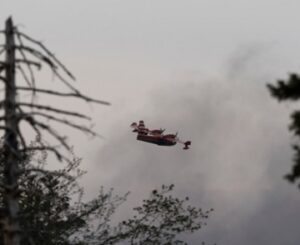 A volunteer firefighter who battled one of Nova Scotia’s biggest wildfires must now shell out thousands of dollars to replace the fishing gear he lost to the flames. Kevin Doane says the fire that burned more than 200 square kilometres in southwest Nova Scotia in late May and June destroyed about $61,000 worth of his lobster fishing gear. Recently, the Nova Scotia government announced a $2,500 grant for aquaculture operators, harvesting businesses, and licensed fish buyers and processors affected by the wildfires. Doane, a lobster fisherman of nearly 50 years, equates the $2,500 grant to “a really big insult.” >click to read< 15:29
A volunteer firefighter who battled one of Nova Scotia’s biggest wildfires must now shell out thousands of dollars to replace the fishing gear he lost to the flames. Kevin Doane says the fire that burned more than 200 square kilometres in southwest Nova Scotia in late May and June destroyed about $61,000 worth of his lobster fishing gear. Recently, the Nova Scotia government announced a $2,500 grant for aquaculture operators, harvesting businesses, and licensed fish buyers and processors affected by the wildfires. Doane, a lobster fisherman of nearly 50 years, equates the $2,500 grant to “a really big insult.” >click to read< 15:29
‘Woefully inadequate’: N.S. announces $2,500 grant for fishers impacted by wildfires
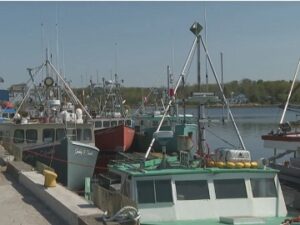 More than two months after the Shelburne County wildfire, local fishers are still facing uncertainty around what gear they will have ready in time for lobster season. The loss of one million dollars’ worth of all types of fishing gear for 17 local fishers means an impact on the industry can be expected come fall. “For lobster season, it’s not like it just happens,” explained Dan Fleck. “The gear has to be received in plenty of time and to be repaired and to make the trawls, to rig it, to get everything done. “It’s a busy time. It’s not just the opening of the season, it’s the month or two leading up to it to get everything ready.” >click to read< 17:53
More than two months after the Shelburne County wildfire, local fishers are still facing uncertainty around what gear they will have ready in time for lobster season. The loss of one million dollars’ worth of all types of fishing gear for 17 local fishers means an impact on the industry can be expected come fall. “For lobster season, it’s not like it just happens,” explained Dan Fleck. “The gear has to be received in plenty of time and to be repaired and to make the trawls, to rig it, to get everything done. “It’s a busy time. It’s not just the opening of the season, it’s the month or two leading up to it to get everything ready.” >click to read< 17:53
N.S. fishermen say province isn’t doing enough to cover wildfire losses
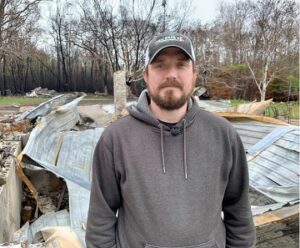 Kevin Doane was living in Roseway, N.S., when the fire broke out in late May. He said his losses include 100 lobster traps, rope and fishing gear. With the cost of a new trap sitting at around $300, he said he needs roughly $30,000 for traps alone. Some fishermen are out hundreds of thousands of dollars, he said. “This is a big loss and all we’re asking for is some of the money, our tax dollars back that we’ve paid in,” said Doane, who was living in Roseway, N.S., at the time of the fires. Fisherman Kasey DeMings said the support is inadequate. “It’s not enough to do anything,” he said. “It really isn’t. It wouldn’t even be a drop in the bucket to start rebuilding.” DeMings is a volunteer firefighter whose Carleton Village, N.S., home burned down in the wildfires while he was out fighting fires. >click to read< 07:43
Kevin Doane was living in Roseway, N.S., when the fire broke out in late May. He said his losses include 100 lobster traps, rope and fishing gear. With the cost of a new trap sitting at around $300, he said he needs roughly $30,000 for traps alone. Some fishermen are out hundreds of thousands of dollars, he said. “This is a big loss and all we’re asking for is some of the money, our tax dollars back that we’ve paid in,” said Doane, who was living in Roseway, N.S., at the time of the fires. Fisherman Kasey DeMings said the support is inadequate. “It’s not enough to do anything,” he said. “It really isn’t. It wouldn’t even be a drop in the bucket to start rebuilding.” DeMings is a volunteer firefighter whose Carleton Village, N.S., home burned down in the wildfires while he was out fighting fires. >click to read< 07:43
Abbott’s Harbour wharf blocked off without notice to fishermen
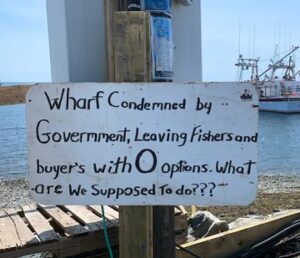 For Pubnico-area lobster fisherman Jaron d’Entremont, the Abbott’s Harbour wharf has been his home port since he began his fishing career six years ago. “One day I was there checking my boat and I saw inspectors there looking around checking underneath the wharf. A month later without any notice they put the blocks there and deemed it unsafe, “Fishermen are permitted to walk down on the Yarmouth County wharf to check their vessels, said d’Entremont, but vehicular traffic is prohibited. Diggdon noted the Abbott’s Harbour wharf is under DFO’s Small Craft Harbour program and is classified as a core fishing harbour meaning “it is deemed critical to the commercial fishing industry.” >click to read< 12:28
For Pubnico-area lobster fisherman Jaron d’Entremont, the Abbott’s Harbour wharf has been his home port since he began his fishing career six years ago. “One day I was there checking my boat and I saw inspectors there looking around checking underneath the wharf. A month later without any notice they put the blocks there and deemed it unsafe, “Fishermen are permitted to walk down on the Yarmouth County wharf to check their vessels, said d’Entremont, but vehicular traffic is prohibited. Diggdon noted the Abbott’s Harbour wharf is under DFO’s Small Craft Harbour program and is classified as a core fishing harbour meaning “it is deemed critical to the commercial fishing industry.” >click to read< 12:28
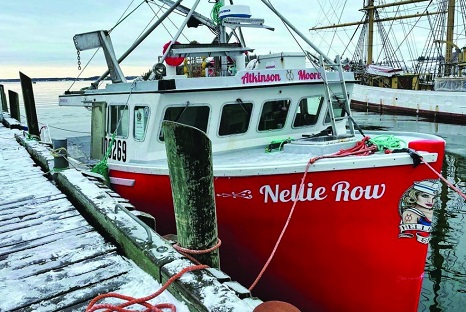
Setting Her Own Course – Lobstering with Lunenburg Harvester Gail Atkinson
Gail Atkinson is one of Canada’s very few female lobster harvesters, who employs an almost entirely female crew aboard the Nellie Row. Gail Atkinson grew up on Cape Sable Island in Southwest Nova Scotia. Coming from a long line of fish harvesters and boat builders, she originally had no desire to follow in her family’s footsteps. “I ended up starting fishing with my father,” said Atkinson. “I started when I was a little bit older because I couldn’t wait to get out of there. But, something happened, and I just ended up back there and I ended up going for a trip fishing, and I just fell in love with it. The rest was history.” Atkinson spent almost 20 years fishing with her father before she went off on her own to run an enterprise. Photos, >click to read< 13:39
Cape Breton boatbuilders help DFO to face commercial, climate change challenges
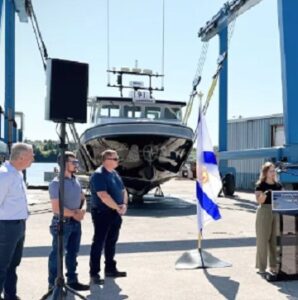 The federal Department of Fisheries and Oceans is having four new patrol boats built in rural Cape Breton to address some of the challenges faced by fisheries enforcement officers. The new boats are larger than the existing ones to better deal with the effects of climate change, larger commercial vessels and heavier fishing gear. Once completed, the boats will be used in the Atlantic region. “As we’ve seen in the last couple of years, climate change is a huge thing … and adverse weather conditions are getting more and more frequent and our officers just don’t take a day off because it’s really bad weather-wise,” said Scott Phillips, DFO’s eastern Nova Scotia area chief of conservation and protection. Photos, >click to read< 17:27
The federal Department of Fisheries and Oceans is having four new patrol boats built in rural Cape Breton to address some of the challenges faced by fisheries enforcement officers. The new boats are larger than the existing ones to better deal with the effects of climate change, larger commercial vessels and heavier fishing gear. Once completed, the boats will be used in the Atlantic region. “As we’ve seen in the last couple of years, climate change is a huge thing … and adverse weather conditions are getting more and more frequent and our officers just don’t take a day off because it’s really bad weather-wise,” said Scott Phillips, DFO’s eastern Nova Scotia area chief of conservation and protection. Photos, >click to read< 17:27
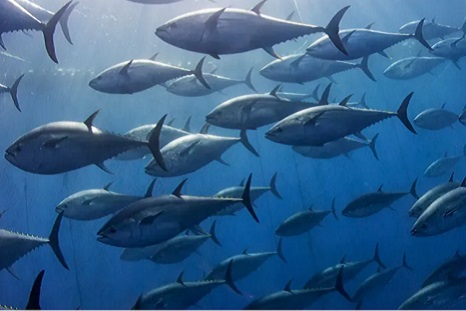
In bluefin tuna, fisheries science is never neat
Pinchin’s eponymous kings are Atlantic bluefin tuna, marine predators that can weigh well over a thousand pounds, “imagine a grand piano shaped like a nuclear weapon,” as Pinchin puts it. Bluefin are extraordinary organisms: warm-blooded, keen-eyed, coated in pigment-producing cells that flash a rainbow of colors when the fish are hauled onto a boat. Pinchin excels at evoking her piscine subjects, whose sickle-shaped tails beat nearly as fast as a hummingbird’s wing. “To stand beside a just-landed giant bluefin, still slick from salt water, feels akin to standing beside a natural marvel like Niagara Falls or an erupting volcano,” writes Pinchin, a Nova Scotia-based science journalist. “There’s beauty, but also danger.” Her book isn’t just an ode to bluefin — it’s about humankind’s obsession with them, a fixation as old as our species. >click to read< 16:29
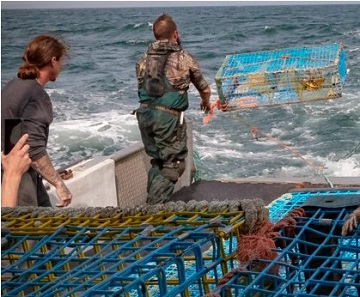
Sipekne’katik First Nation sues federal government for seizing lobster traps
The Sipekne’katik First Nation in Nova Scotia is suing the federal government over treaty right infringement after officers with the Department of Fisheries and Oceans seized lobster traps belonging to its band members. Sipenkne’katik alleges that DFO fishery officers hauled lobster traps belonging to two of its band members from waters in St. Mary’s Bay near Saulnierville, N.S. July 18-19. In a statement of claim that was filed at Nova Scotia Supreme Court in Halifax on July 24, Sipekne’katik states that its members have a treaty right to fish for a moderate livelihood which “means they have a right to sell the lobster they catch.” >click to read< 11:34
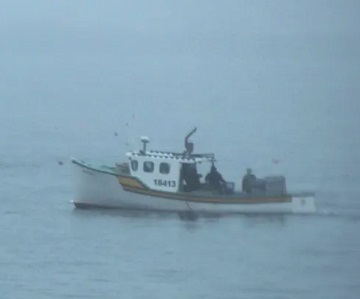
Despite whale detection, western Cape Breton crab fishers will complete quota in days
Part of Snow Crab Area 19, Cape Breton’s largest crab fishing zone in the Gulf of St. Lawrence, has been restricted for at least 15 days by the Department of Fisheries and Oceans (DFO). That comes after a North Atlantic right whale was detected last week by an acoustic sensor near Pleasant Bay. As a result, the Department of Fisheries and Oceans (DFO) has ordered fishers with traps in Area 19 to move them to the far north or south parts of the zone by Monday evening. While it is extra work to move the traps, most fishers anticipate almost no impact on the overall catch. “Catches are good, so a lot of the boats will be finished up in the next couple of days,” said Sandy Doucette, who fishes out of Cheticamp. >click to read< 20:00
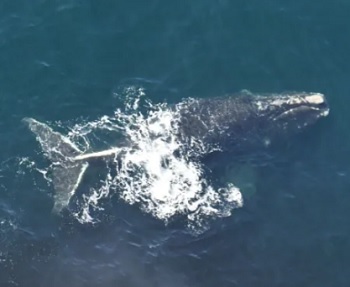
Whale detection shuts down major portion of Cape Breton snow crab fishery
The detection of an endangered North Atlantic right whale in the Gulf of St. Lawrence has forced the temporary closure of a major portion of the snow crab fishery off western Cape Breton. It comes just days after the season opened. The whale was detected by an acoustic sensor. Fishermen have until 5 p.m. Monday to move their gear out of a large closure zone. Many had just dropped their pots. The closure is set for 15 days. The Department of Fisheries and Oceans posted a notice of the closure to harvesters on Friday. It affects about 140 licence holders in what is known as Crab Fishing Area 19. >click to read< 17:22







